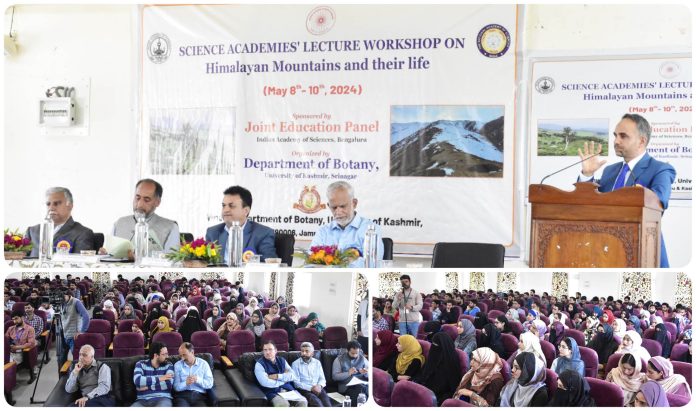‘KU’s 3-day workshop to come up with recommendations for policy framing’
SRINAGAR: To delve into the intricate ecosystems of the Himalayan region, particularly in light of climate change, the Department of Botany, University of Kashmir (KU), Wednesday inaugurated a 3-day workshop here.
Titled, ‘Science Academies’ Lecture Workshop on Himalayan Mountains and Their Life’, the workshop is being sponsored by the Joint Education Panel, Indian Academy of Sciences, Bengaluru.
The workshop is open and free to undergraduate and graduate students, research scholars and young faculty members from colleges, universities and other academic and research institutions with around 150 participants taking part on first come, first served basis.
During the inaugural ceremony, programme convenor, Prof R Uma Shaanker from IIT, Jammu in his keynote, underlined the need for devising a model system to attain the desired goals and objectives.
“We have been non-porous all along but we need to change that mindset and exchange ideas and encourage interdisciplinarity,” he said, adding that having confidence in one’s efforts empowers one in achieving greater heights.
Dean, Research, Prof M Sultan Bhat lamented on the “insensitivity of the masses towards nature” and termed climate change just a “proxy”.
“We should not watertight our approach towards research and mitigation instead, we need to adopt an interdisciplinary approach towards safeguarding our natural resources for the future generations,” he said, adding that we should become active partners in spreading awareness among the youth for ensuring lasting preservation and conservation efforts.
Dean, School of Biological Sciences, Prof Abdul Hamid Wani, highlighted the significance of the Himalayan region to not just Kashmir but to the entire South Asia.
“The Himalayan region harbours our natural resources including water bodies, plantation and other life forms but our unplanned urbanisation and laying out of roads, industry and infrastructure, is detrimental to the conservation and restoration of the region’s biodiversity,” he said.
Head, Department of Botany, Prof Zahoor A Kaloo, provided insights into the unprecedented damage nature is enduring at the hands of humans.
“Human greed and poor policy frameworks have only added to the deterioration of our resources,” he said.
Outlining the objectives of the programme, workshop coordinator, Prof Manzoor A Shah, said that the intent is to equip the participants with the knowledge, confidence and the required skillset to engage in discussions on issues related to the Himalayan ecosystems and biodiversity.
“Half of the biodiversity hotspots are in the mountains and half of the global population receives fresh water from them. Also, 20 percent of the land area is covered by the mountains, yet they are considered dull and devoid of life,” Prof Shah noted.
The recommendations and the workshop outcomes will be shared with the relevant stakeholders for future policy and decision making,” he reiterated, adding that we need timely mitigation of resources and life forms of the Himalayan region.


